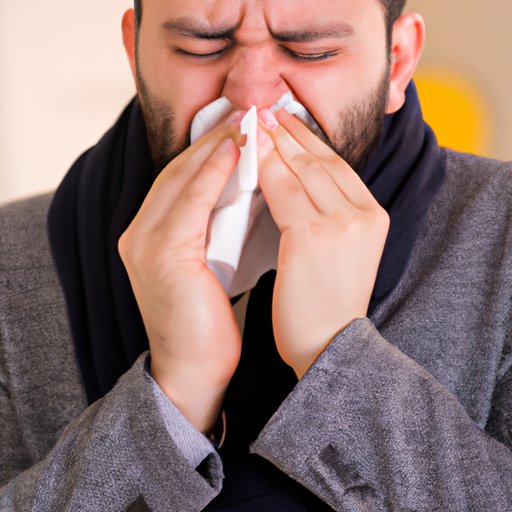Introduction
Learning to recognize cold symptoms is crucial for preventing and managing colds. This article is a comprehensive guide to the symptoms of the common cold, how to manage them, and when to seek medical attention. It is crucial to take care of yourself and those around you in the cold season.
A Comprehensive Guide to Cold Symptoms
A cold is a viral respiratory infection that can cause a sore throat, cough, runny nose, and congestion. It is a prevalent condition that can spread easily, especially in crowded areas like schools and offices.
Common cold symptoms include:
- Sneezing
- Runny nose
- Coughing
- Sore throat
- Nasal congestion
- Fatigue
The symptoms usually appear a few days after exposure to the virus and may last for about a week. However, in some cases, it might take longer for the symptoms to go away, especially in people with weakened immune systems. Cold symptoms are usually milder than those of the flu and have a slower onset.
Don’t Let a Cold Get You Down
In addition to the common cold symptoms above, several other symptoms indicate you have a cold.
- Headaches
- Sinus pressure
- Muscle aches
- Fever (low-grade)
- Chest congestion
It is essential to seek medical attention if the symptoms are severe or do not improve, especially if you have chronic health problems like asthma or cardiovascular disease. If your symptoms worsen or persist, your doctor may recommend over-the-counter cold medications like decongestants, pain relievers, or cough suppressants.
Colds can cause severe complications in some people, particularly the elderly, young children, and people with chronic health problems. Examples of complications include pneumonia, bronchitis, and sinus or ear infections. It is essential to know the warning signs of these complications to seek medical help.
From a Runny Nose to a Sore Throat: The Varied Symptoms of the Common Cold
People may experience different symptoms of a cold and vary in the severity of the symptoms. The virus that causes the cold can cause inflammation and irritation in different parts of the respiratory system, leading to different symptoms.
For example, some people may experience a runny nose primarily, while others might have a sore throat and cough. Similarly, some people may experience fever, chills, and body aches, while others only have mild symptoms.
The symptoms of a cold also vary depending on the individual’s overall health. People with weaker immune systems or underlying medical conditions usually have more severe or prolonged symptoms.
Feeling Under the Weather? Here’s What You Need to Know About Cold Symptoms
While there is no cure for a cold, people can manage the symptoms at home or with over-the-counter medication.
If you have a cold, it is essential to:
- Stay hydrated by drinking plenty of fluids, including water, tea, and broth.
- Get plenty of rest to help the body fight off the virus.
- Use a humidifier to keep the air moist, which can help alleviate nasal congestion and sore throat.
- Take over-the-counter pain relievers, like ibuprofen or acetaminophen, for headaches or fever.
- Use over-the-counter decongestants or saline nasal spray to help relieve nasal congestion.
People with colds are highly contagious and can spread the virus to others. The virus spreads through respiratory droplets when a person coughs or sneezes. To avoid spreading the virus, people should:
- Wash their hands often with soap and water for at least 20 seconds.
- Use hand sanitizer with at least 60% alcohol if soap and water are unavailable.
- Cover their nose and mouth when coughing or sneezing, preferably with a tissue or elbow.
- Avoid close contact with people who have a cold.
- Stay at home when they are sick to avoid spreading the virus to others.
Surviving the Cold Season: Tips for Managing Your Symptoms and Getting Back to Feeling Good
To stay healthy during the cold season, it is essential to:
- Eat a healthy diet to boost your immune system.
- Stay hydrated. Drinking fluids, especially water, can replace fluids lost from fever and mucus production, which can help alleviate symptoms.
- Stay warm by wearing layers to avoid catching a chill.
- Get enough sleep to reduce stress and boost your overall health.
It is also essential to keep stress levels low by practicing relaxation techniques like meditation, yoga, or deep breathing exercises.
The Early Warning Signs of a Cold: What to Look Out For and How to Prevent It From Getting Worse
Early signs of a cold include:
- Sneezing
- Runny nose
- Sore throat
- Fatigue
- Mild fever
It is crucial to take preventive measures to avoid getting a cold, especially during cold and flu season.
Prevention tips include:
- Washing your hands frequently with soap and water.
- Avoiding close contact with people who have a cold.
- Staying home when you are sick and avoiding contact with others.
- Covering your nose and mouth when coughing or sneezing.
Conclusion
It is essential to understand the symptoms of a cold and how to manage them. While there is no cure for a cold, people can manage the symptoms at home, get rest, and stay hydrated. It is also vital to take preventive measures to avoid getting a cold, including washing hands frequently, covering your mouth, and avoiding close contact with people who are sick.
By taking care of yourself and those around you, you can stay healthy and reduce the risk of spreading the virus to others.
